
Demystifying Ovarian Cysts: Diagnosis, Treatment, and Reassurance at Precision Gynaecology with Dr. Neha Poddar
Ovarian cysts are fluid-filled or semi-solid sacs that develop on or within one of your ovaries, the small organs that produce eggs and hormones. They're very common and often harmless, especially during your childbearing years. However, some ovarian cysts can cause pain or other symptoms and may require treatment.
At Precision Gynaecology, Dr. Neha Poddar is dedicated to women's health and offers expert diagnosis, treatment options, and reassurance for women with ovarian cysts.
Understanding Ovarian Cysts:
-
There are various types of ovarian cysts, most of which are benign (not cancerous).
-
The most common types are functional cysts, which form during ovulation (egg release) and usually disappear on their own within a few months.
-
Other types of cysts include dermoid cysts, which can contain hair, skin, or other tissues, and endometriomas, which are linked to endometriosis, a condition where tissue similar to the uterine lining grows outside the uterus.
Causes and Risk Factors:
-
Hormonal Disturbance
-
Functional cysts are related to ovulation.
-
Endometriomas develop due to endometriosis.
-
Dermoid cysts arise from egg cells that contain remnants of various tissues.
-
Certain factors can increase your risk of developing ovarian cysts, such as:
-
Endometriosis
-
Polycystic ovary syndrome (PCOS)
-
Pregnancy
-
A family history of ovarian cysts
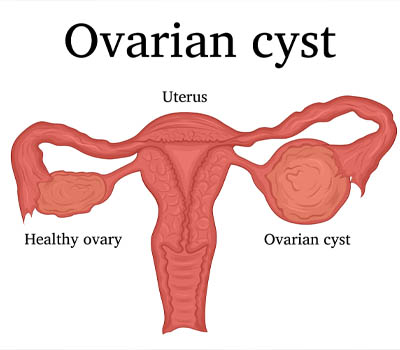
Symptoms of Ovarian Cysts:
Many women with ovarian cysts have no symptoms. However, if a cyst grows large or ruptures, you may experience:
-
Pelvic pain, which can be sharp, dull, or achy
-
Bloating or abdominal swelling
-
Pain during intercourse
-
Painful or irregular menstrual periods
-
Difficulty getting pregnant (in some cases)
-
Feeling full after eating even a small amount
Diagnosis:
Dr. Poddar can diagnose ovarian cysts through various methods, including:
-
MRI - when diagnosis is uncertain or to rule out cancers
-
Pelvic exam
-
Ultrasound scan
-
Blood tests (in some cases)
-
Laparoscopy (a minimally invasive surgical procedure using a laparoscope, a thin lighted instrument, to view the pelvic organs) in complex cases
Treatment Options:
The best treatment for an ovarian cyst depends on various factors, such as the type of cyst, its size, and your symptoms. In many cases, no treatment is necessary, especially for functional cysts that are small and cause no problems. Dr. Poddar may recommend:
-
Monitoring: Regular checkups with ultrasound to track the cyst.
-
Pain management: Medication to manage pain caused by the cyst.
-
Hormonal birth control: Birth control pills or other hormonal medications can help regulate ovulation and prevent new cysts from forming.
-
Surgery: If the cyst is large, ruptures, or is suspected to be cancerous, Dr. Poddar may recommend surgery to remove the cyst or, in some cases, the ovary.
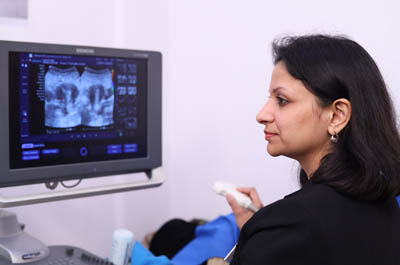
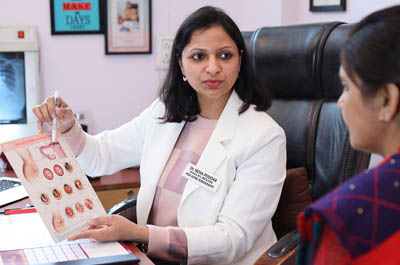
Reassurance and Next Steps:
Ovarian cysts are a common occurrence, and most are nothing to worry about. At Precision Gynaecology, Dr. Poddar understands that a cyst diagnosis can cause concern. She will provide reassurance, discuss your individual situation, and recommend the most appropriate course of action for you.
Remember, regular checkups are crucial for early detection and peace of mind. If you're experiencing pelvic pain, bloating, or other symptoms that could be related to an ovarian cyst, schedule an appointment with Dr. Neha Poddar at Precision Gynaecology. Early diagnosis and treatment can help prevent complications.
FAQS
Ovarian cysts are fluid-filled sacs that develop on or within the ovaries. These cysts can vary in size, ranging from small to large, and may be filled with fluid or contain tissue such as hair, teeth, or fat. While most ovarian cysts are harmless and resolve on their own without treatment, some cysts may cause symptoms or complications. Dr. Neha Poddar at Precision Gynaecology specializes in diagnosing and managing ovarian cysts to ensure optimal ovarian health.
Ovarian cysts can develop for various reasons, including hormonal imbalances, ovulation-related factors, and underlying medical conditions. Functional ovarian cysts, which form during the menstrual cycle, are the most common type and typically resolve on their own within a few menstrual cycles. Other types of ovarian cysts include dermoid cysts, cystadenomas, and endometriomas, which may require medical intervention. Dr. Neha Poddar can conduct thorough evaluations to determine the type and cause of ovarian cysts and recommend appropriate treatment options at Precision Gynaecology.
Many women with ovarian cysts may not experience any symptoms, especially if the cysts are small and do not cause complications. However, larger cysts or those that rupture or become twisted (torsion) may cause symptoms such as pelvic pain or pressure, bloating, irregular menstrual bleeding, pain during intercourse, or difficulty emptying the bladder or bowels. If you suspect you may have ovarian cysts or are experiencing symptoms, it's important to consult with Dr. Neha Poddar for evaluation and management at Precision Gynaecology.
Treatment for ovarian cysts depends on various factors such as the size, type, and symptoms of the cysts, as well as the woman's age and reproductive goals. In many cases, small ovarian cysts that are asymptomatic may not require treatment and may resolve on their own over time. Dr. Neha Poddar may recommend watchful waiting with regular monitoring or prescribe medications to relieve symptoms such as pain or discomfort. Surgical interventions such as cystectomy (removal of the cyst) or oophorectomy (removal of the ovary) may be considered for larger cysts, persistent symptoms, or concerns about ovarian cancer. At Precision Gynaecology, Dr. Poddar provides personalized treatment plans tailored to each patient's needs and goals.

Delving Deeper into Dermoid Cysts: Causes, Diagnosis, and Treatment at Precision Gynaecology with Dr. Neha Poddar
Dermoid cysts, a specific type of ovarian cyst, can sound alarming due to their unusual content. However, Dr. Neha Poddar at Precision Gynaecology can assure you that most dermoid cysts are benign and treatable. Let's explore dermoid cysts in more detail:
Understanding Dermoid Cysts:
-
Dermoid cysts are benign (noncancerous) cysts that contain tissues like hair, skin, sweat glands, or even teeth.
-
These tissues develop from primitive cells present during fetal development that get trapped within the ovary.
-
Dermoid cysts can occur in other locations besides the ovaries, such as the face, scalp, and back, but they're most common in the ovaries.
Causes:
As mentioned earlier, dermoid cysts arise from errors during fetal development when cells destined to become skin, hair, etc., become trapped within the ovary. The exact reason for this entrapment is unknown.
Risk Factors:
While the cause is unknown, certain factors may increase your risk of developing a dermoid cyst, including:
-
Age: They are more common in women of childbearing age (15-50 years old).
-
Family history: Having a close relative with a dermoid cyst may slightly increase your risk.
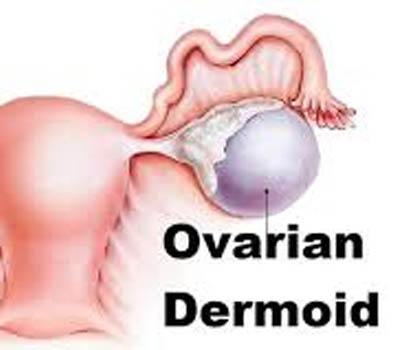
Symptoms of Dermoid Cysts:
Many women with dermoid cysts experience no symptoms, especially if the cyst is small. However, if the cyst grows large, you may experience:
-
Pelvic pain, which can be sharp, dull, or achy
-
Bloating or abdominal swelling
-
Pain during intercourse
-
Pressure or discomfort in the lower abdomen
-
Irregular menstrual periods (in some cases)
Diagnosis:
Dr. Poddar can diagnose dermoid cysts using various methods, including:
-
Pelvic exam: She may feel a lump on your ovary during a pelvic exam.
-
Ultrasound scan: Ultrasound imaging can help identify the cyst's characteristics, such as its density and the presence of solid components within the fluid.
-
MRI scan (in some cases): An MRI scan can provide a more detailed picture of the cyst and surrounding tissues, which can be helpful in differentiating dermoid cysts from other types of ovarian cysts.
Treatment Options:
Treatment for a dermoid cyst typically involves surgical removal. There are two main surgical approaches:
-
Laparoscopy: This minimally invasive surgery uses a laparoscope, a thin lighted instrument inserted through a small incision in the abdomen, to visualize and remove the cyst.
-
Laparotomy: In some cases, a larger abdominal incision may be necessary, especially for very large cysts or if there are concerns about the cyst's nature.
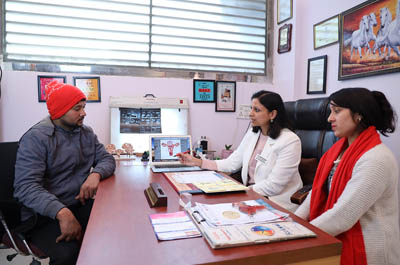
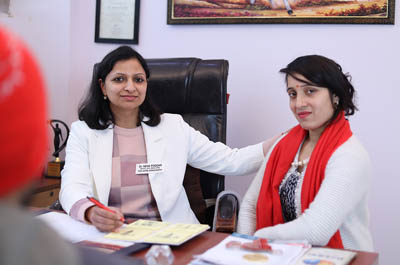
Reassurance and Next Steps:
Dermoid cysts are uncommon, but they are treatable. At Precision Gynaecology, Dr. Poddar understands that any cyst diagnosis can cause apprehension. She will provide reassurance, explain the diagnosis in detail, and recommend the most suitable surgical approach based on your specific situation.
Remember, early detection is key. If you're experiencing pelvic pain, bloating, or other symptoms that could be related to an ovarian cyst, schedule an appointment with Dr. Neha Poddar at Precision Gynaecology. Through comprehensive evaluation and treatment, Dr. Poddar can help ensure your optimal gynecological health.
FAQS
Dermoid cysts, also known as mature cystic teratomas, are noncancerous growths that develop from germ cells and can contain various types of tissue such as skin, hair, teeth, and even bone. These cysts typically form during fetal development and are usually found in the ovaries, although they can occur in other parts of the body as well. While dermoid cysts are generally benign, they may cause symptoms or complications if they grow large or become twisted (torsion). Dr. Neha Poddar at Precision Gynaecology specializes in diagnosing and managing dermoid cysts to ensure optimal ovarian health.
Dermoid cysts develop from germ cells that are present in the ovaries and have the potential to form different types of tissues. It is not entirely clear why some germ cells develop into dermoid cysts, but it is believed to be related to genetic factors or errors in fetal development. Dermoid cysts are considered congenital and may be present from birth, although they may not become noticeable until later in life. Dr. Neha Poddar can conduct thorough evaluations to diagnose dermoid cysts and discuss appropriate treatment options at Precision Gynaecology.
Dermoid cysts may not cause symptoms in many cases and may be discovered incidentally during routine pelvic exams or imaging tests. However, larger dermoid cysts or those that become twisted (torsion) may cause symptoms such as pelvic pain or pressure, bloating, irregular menstrual bleeding, pain during intercourse, or difficulty emptying the bladder or bowels. In rare cases, dermoid cysts may rupture, leading to severe abdominal pain and potentially life-threatening complications. If you suspect you may have dermoid cysts or are experiencing symptoms, it's important to consult with Dr. Neha Poddar for evaluation and management at Precision Gynaecology.
Treatment for dermoid cysts depends on various factors such as the size, location, and symptoms of the cysts, as well as the woman's age and reproductive goals. In many cases, small dermoid cysts that are asymptomatic may not require treatment and may be monitored with regular pelvic exams and imaging tests. Dr. Neha Poddar may recommend surgical removal of larger dermoid cysts or those causing symptoms or complications. At Precision Gynaecology, Dr. Poddar provides personalized treatment plans tailored to each patient's needs and goals.
- General Gynae
- Menstrual Disorders
- Vaginal discharge
- Cervical Cancer - Screening & Vaccination
- Pelvic inflammatory disease (PID)
- Infertility treatment (IVF & IUI)
- Uterine polyps
- Septate Uterus (Uterine Septum)
- Uterine Fibroids
- Ovarian Cysts
- Dermoid Cysts
- Ectopic Pregnancy
- Endometriosis
- Menopause
- Hormonal Disorders
- PCOS and Hyperprolactinemia
- Gynae Endoscopy
- Uro Gynae
Are you seeking a qualified and experienced gynecologist and obstetrician in Ghaziabad? Look no further than Dr. Neha Poddar!
- Call 0120 3167206, 9958170476
- Whatsapp 9318413696

Doctors
-

Dr. Madhu Poddar
-

Dr. R.K. Poddar
-

Dr. Neha Poddar
-

Dr. Rahul Poddar